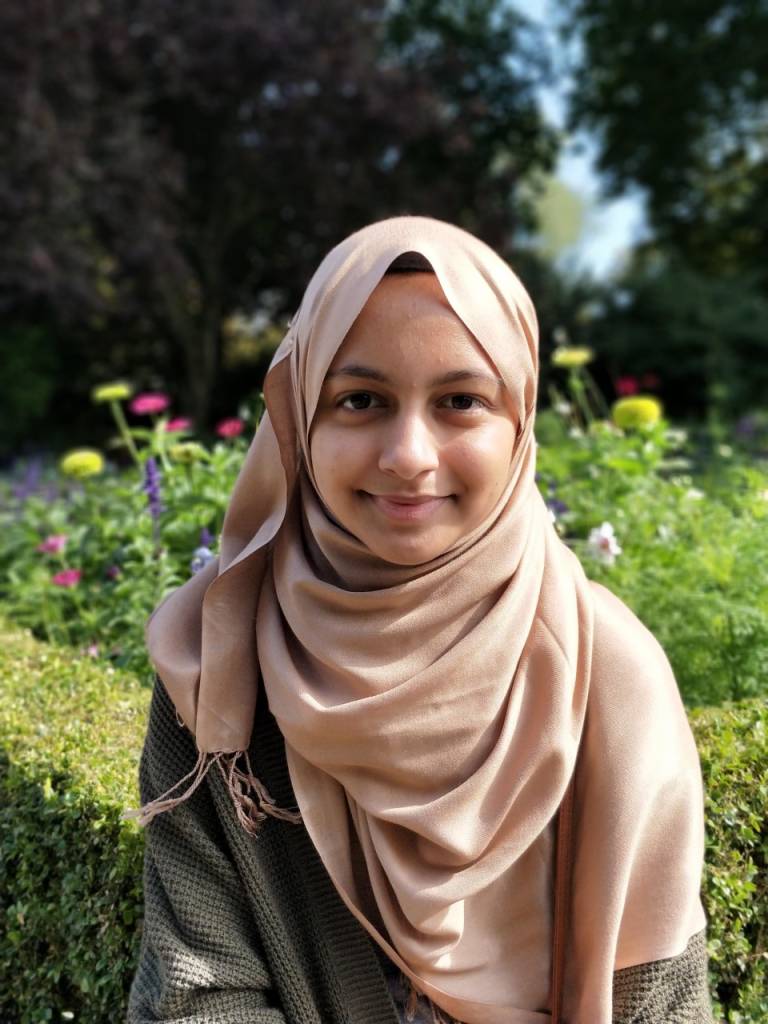UCL History speaks to undergraduate student and Laidlaw scholar Fareeha Masood
22 August 2020
UCL History are delighted to chat with second year undergraduate student Fareeha Masood, who is currently participating in the Laidlaw Research and Leadership Programme over the summer.

Hi Fareeha, thanks for talking to us! Can you tell us a bit about yourself?
Sure! I’ve just completed my first year as a History undergraduate. This year, I’ve also become a member of wider UCL communities, such as the Institute of Making, and student societies like the Islamic Society. Each of these spaces have helped me keep up my existing interests in academics, art and design, and faith. They have also introduced me to so many new pursuits and inspiring people: most recently, I’ve picked up 3D modelling in the lockdown classes run by IoM technicians.
How have you found studying History at UCL so far? What have been your best bits?
I love the way history gives you a glimpse into the lives of people who may have lived in very different circumstances and situations from your own, and yet still enables you to relate to them through a universal human experience. For this reason, I’ve always been able to get stuck into any historical era or region – for example, I took the opportunity to study an ancient history module for the first time this year. I never would have expected to love it so much, and will now be studying four ancient history modules next year! Discovering new types of history has been a real highlight that’s come out of the expertise available at UCL.
We hear that you’re working with the History Head of Department Professor Eleanor Robson this summer as a Laidlaw Scholar! Can you tell us a bit more about this?
The Laidlaw scholarship is a two-year research and leadership programme, across 12 global universities. As part of my first summer on the programme, I’ve had the wonderful opportunity to work with Professor Eleanor Robson on a research report. My research looks at how resources on cuneiform texts (one of the earliest systems of writing, discovered in modern-day Iraq), can be made accessible to Arabic-speaking audiences in the Middle East. It’s been so fulfilling to be part of a project that has the potential to make a real impact in the world. We hope that by making resources on cuneiform accessible to Middle Eastern audiences, they will be able to exercise autonomy in producing history for local needs and audiences.
The programme has also allowed me to (virtually) meet some amazing students across UCL, and other universities in America, Canada and Hong Kong. We’ve made some great friendships despite being in lockdown, and I can’t wait to meet sometime in the future!
We have lots of new students starting with us in September – what would your advice be for them?
Don’t stress! I know this year will be looking very different to what you had imagined, but you have so many people in your corner here at UCL. Heads of Departments, Student Union officers, and students who are running societies next year have been working hard this summer to make your experience as fulfilling as every other fresher year.
Also, don’t feel under any pressure to do copious amounts of preparation before beginning this September. The History department’s first-year modules are great training wheels, and help you build up all the skills you’ll need.
What are your plans for the future?
I won’t pretend I know for certain, and I don’t expect I’ll have one ‘calling’ that I’ll pursue throughout my career. The most valuable thing I’ve learnt through the leadership training I’ve had through the Laidlaw Scholarship is that making change isn’t limited to one sector, or even the position you hold within it. Ethical leadership can come from anywhere you enact change. For the near future then, I hope to continue spending my time at university developing myself, so that wherever I end up, I am able to bring value and make an impact in people’s lives.
 Close
Close

